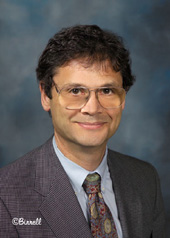 UNMC Scientist Laureate Stephen Rennard, M.D., talks about his work life and interests.
UNMC Scientist Laureate Stephen Rennard, M.D., talks about his work life and interests.
EDITOR’S NOTE: Dr. Rennard received UNMC’s inaugural Scientist Laureate Award, the highest recognition given to a UNMC scientist. This profile is part of a series highlighting Dr. Rennard and the other researchers who were named UNMC Distinguished Scientists for 2006. The researchers were profiled in UNMC Today leading up to a private ceremony today to recognize their achievements.
- Name: Stephen Rennard, M.D.
- Title: Larson Professor of Medicine, pulmonary and critical care – internal medicine, College of Medicine
- Joined UNMC: 1984
- Hometown: St. Louis
Describe your research in 25 words or less.
I study COPD at both the clinical and basic level. These studies include development and testing of new therapies, particularly as they relate to lung repair and tissue regeneration and range from stem cells to smoking cessation.
How did you decide to pursue this area of research?
Prior to coming to UNMC, I studied the cell biology of interstitial lung diseases. These are rare conditions. In Nebraska, it seemed more appropriate to study a common disease and COPD is the most common lung disease. It is currently the fourth leading cause of death in the United States. Cigarette smoking is the most common cause of COPD. The late Irving Kass and David Daughton had initiated a research program in smoking cessation at UNMC prior to my arrival. I had the opportunity to initiate a collaboration that continued until Mr. Daughton’s recent retirement. This had led to a number of clinical trials as well as mechanistic studies evaluating the effect of cigarette smoke in human subjects, in animals and in vitro.
When did you realize you were interested in research?
In residency. It was rewarding to help people who were sick, but unsatisfying to offer so little.
What are the greatest challenges in research today?
Keeping pace with the advances in biology and applying these advances to ongoing research projects.
Best advice for new researchers?
Enjoy yourself.
When an experiment stalls, what drives you to continue on?
It is important not to get too frustrated with problems (or rejection), if you want to pursue a research career.
Who has been your greatest teacher?
Hard to say. As a medical student a resident once said, “There are no bad teachers. If you are a good student, you can learn from everyone. Your job is to figure out how.” It is good advice. My best teachers have been students and colleagues.
Tell us about your family and hobbies outside the lab.
We have eight children and seven grandchildren. We all like camping and hiking.
Describe your most notable research achievement.
The most widely noted has been our evaluation of anti-inflammatory activity of chicken soup. The demonstration that circulating stem cells can contribute to lung repair, however, would be my choice.
Clarify a common misconception about research?
Money is seldom the limiting factor in pursuing research questions. The limiting factor is time.
What would you tell a student interested in a research career?
Go for it.
List three things few people know about you.
- At one time, I could swim well and played water polo competitively;
- My undergraduate major was folklore and mythology; and
- My wife was president of the Omaha Chapter of the League of Women Voters.